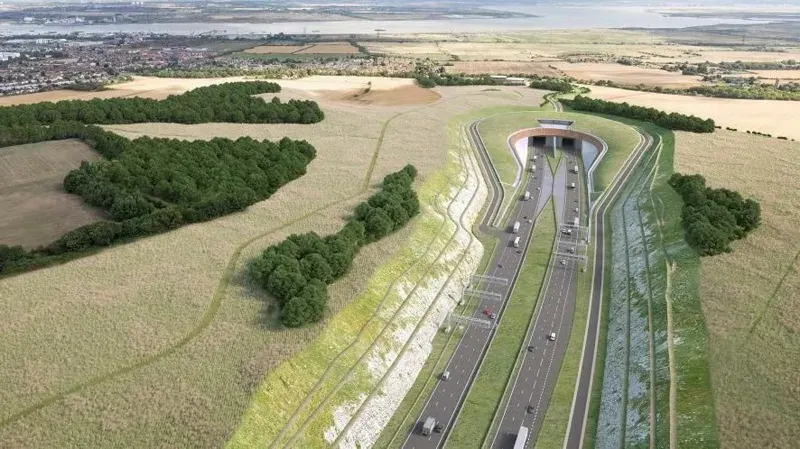UK Awards £590m Contract for Largest Road Tunnel Project

The government has approved a £590 million project to create the UK's largest road tunnel.
The Lower Thames Crossing, which will connect Tilbury, Essex, and Gravesend, Kent, is expected to cost £10 billion.
Plans for the 14.5-mile (23-kilometer) road were authorized in March following a 16-year process that had already cost £1.2 billion.
Chancellor Rachel Reeves stated that the crossing would facilitate the "smoother, less congested passage of vital goods from Europe to our regions".
It was part of a £1 billion package launched on Monday to strengthen England's transport infrastructure.
The government stated that the Lower Thames Crossing was a "national priority" and that it was searching for private financing.
National Highways hoped that the project would reduce traffic at Dartford Crossing by 20%.
Construction was anticipated to begin in 2026, with an opening date of 2032.
"This is a turning point for our national infrastructure, and we're backing it with funding to support thousands of jobs and connect communities," Reeves told the crowd.
Heidi Alexander, Transport Secretary, added, "This project is essential for improving the resilience of a key freight route and is critical to our long-term trade with Europe."
However, Treasury Minister Emma Reynolds failed to address questions regarding the initiative during a national radio program.
When asked where the new crossing will be, she named it the "Dartmouth tunnel" instead of Dartford and couldn't "recall the landing zone" when speaking with LBC's Nick Ferrari.
When asked about the cost, Reynolds responded, "It's going to cost quite a lot of money," implying it would be "several billion pounds."
National Highways has predicted that the cost will range between £9.2 billion and £10.2 billion, depending on the funding arrangement used.
The road will connect the A2 and M2 in Kent to the A13 and M25 in Thurrock, running from east of Tilbury to east of Gravesend.
Approximately 2.6 miles (4.2 kilometres) of the route will be underground, with northern and southbound tunnels running parallel beneath the Thames.
Logistics UK, which represents the transportation and logistics sector, welcomed the funding allocation.
"Efficient logistics with minimal delays is critical to the delivery of the government's growth agenda, and our members are delighted to hear that funding has been made available to start work on the long-planned Lower Thames Crossing after a decade of holdups at this vital interchange," Kevin Green, our policy director, told me.
"It is imperative that the government also sets out a plan for providing and securing the full funding required to complete the project - our members deserve to be able to deliver efficiently for the industry they support so that the economy can benefit."
However, activists are concerned that the activities will have an impact on old woods.
Chris Todd, director of Transport Action Network, earlier described the decision as "absolute madness."
He went further: "The only way that the government can afford this white elephant would be to take money from all the other nations and regions in the UK."